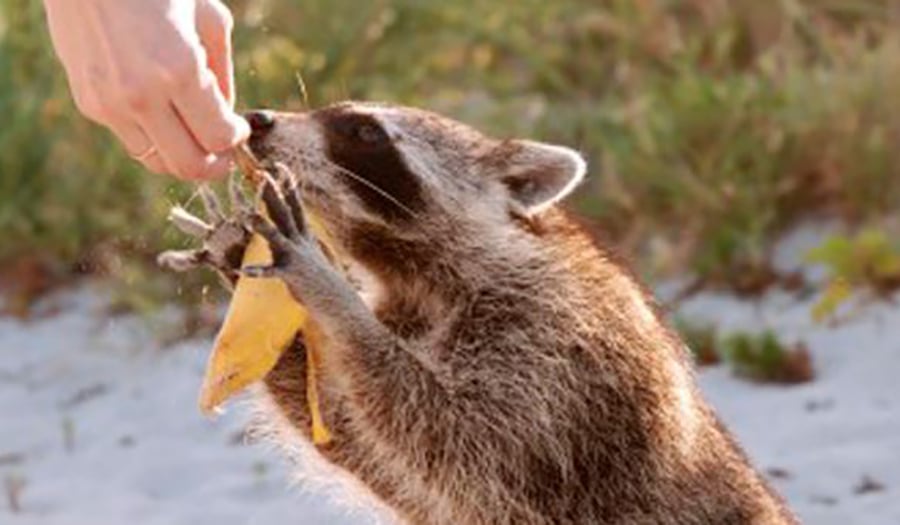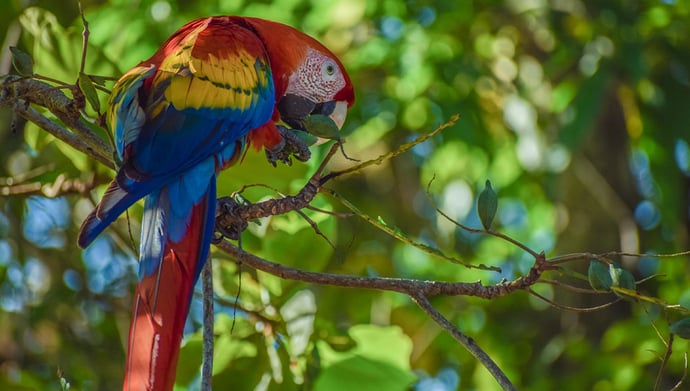Feeding wild animals, such as raccoons, monkeys, “pizotes” (coati) or iguanas with toasted potatoes, bread, cookies or some other processed food has a negative impact on their health and threatens the stability of the ecosystem.
Obviously for monkeys it is easier to go and open a backpack to steal a cookie, than to walk through the forest looking for fruits and insects, but that cookie has chemical components incompatible with their digestive system. In addition to the fact that certain human conditions have already been reported, such as fat in internal organs and cavities, among others, as determined by studies of the Institute of Wildlife Conservation and Management of the National University.
"We can transmit diseases and vice versa"
According to the research, we have a different amount and variety of parasites than they do, and dead animals have been found that at the time of testing to have parasites that are not of their species, so we deduce that they are transmitted through the food. On the other hand, when animals try to steal food, some people try to prevent them stealing by confronting them and sometimes hit the animal which causes them to attack, and with its strong teeth can cause serious injuries and infect the person. ”
Regarding this same matter, in an investigation conducted at Hotel and Club Punta Leona by Elizabeth Landry, a student at Colorado College and part of the ACM Costa Rica program, the effects of artificial feeding can be negative for wildlife, and it raises concerns about the physical condition and reproductive success, population processes, diseases and community processes.
The study stated that especially the feeding of the capuchin monkeys could increase their dependency on artificial foods and cause aggression between themselves or towards people, which can lead to negative attitudes towards the monkeys and wildlife in general.
Aggression is rare, but should be considered a threat.
“Humans have an innate curiosity about other species, as evidenced by the fact that, in the United States alone, more than 175 million people visit zoos annually. The problem, however, is that Hotel and Club Punta Leona is not a zoo, the present fauna is wild, and excessive interaction in this place is not healthy or safe,”said Landry.
“In fact, during the investigation carried out in the “Carabelas” sector, an act of aggression was detected. A monkey was threatening with an open mouth only a meter away from children and adults. There was a possibility they could attack, scratch or bite, and this would be a serious threat to human health, hence the importance of never feeding to wildlife”.
If you see a wild animal please do not take it out of its home and if you are in trouble call 2630-1081.
Illegal activity
According to Grace Wong, a researcher at UNA, “we have to be clear that feeding wild animals is an illegal activity. Many see an animal and the first thing they say is "the poor thing is hungry". It is not always true, animals get their food naturally, at certain times of the year there are periods of less food availability in the environment, but that is also part of the natural process that helps regulate populations.“ says Wong.
Recommendations:
- Raccoons feed on crabs, birds, wild fruits and other small animals; the monkeys, on fruits and insects. A change in their diet is harmful to their health.
- Homemade or junk food can cause diabetes, cavities, parasites and conditions that shorten the life of the animal or make it lose its ability to find food.
- Do not touch wild animals, they can transmit to you or you can transmit diseases to them; they can also attack to get food.
Fine for feeding wild animals amounts to ¢ 127,000
Article 116 “Ley de Conservación de la Vida Silvestre” (Wildlife Conservation Law):
“There will be a fine of fifteen percent (15%), up to thirty percent (30%) of their base salary, for whoever, without authorization from the National System of Conservation Areas, supplies unauthorized food or substances to wildlife”, States the national legislation.
Source: (Icomvis-UNA)
“The root of the problem in the restaurant is that humans are still feeding the monkeys without thinking about the consequences. One solution is to give more education to humans and apply the rules more rigorously. In a world that is constantly developing, it is necessary to have places like Punta Leona, which protect the land and promote the economy. However, you have to be very careful when there is such a close and interactive cohabitation,”Landry concluded.



